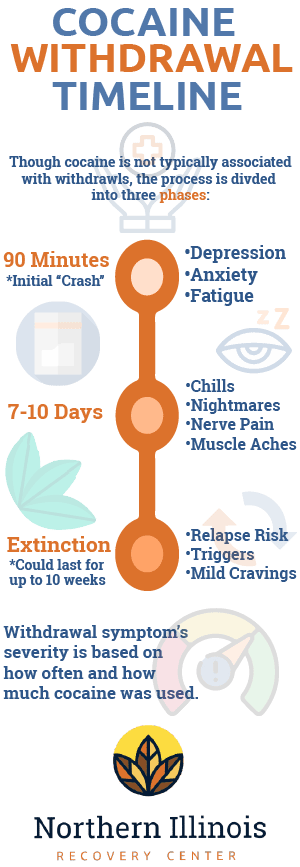According to the National Institute on Drug Abuse (NIDA), the stimulant drug cocaine is a power drug that stimulates the central nervous system. It’s made from the leaves of the coca plant and is typically sold as a white powder. Despite its natural-seeming origins, cocaine is not a safe substance to use. Cocaine is one of the most addictive drugs and can negatively affect a person’s health in many ways.
The National Institute on Drug Abuse also states that about 24,486 people lost their lives due to cocaine-involved overdoses in 2021. There is no doubt about the fact that this addictive drug is a detriment to our community. People who suffer from substance use disorder involving cocaine or other substances need access to professional treatment from medical professionals who care. This is why we strive to provide behavioral healthcare and detox services to those in need. Our stimulant addiction treatment program is here to help.
After dependence comes addiction when a person will continue to use cocaine compulsively despite any negative consequences. Detoxification is the first step in overcoming cocaine use disorder. Here at Northern Illinois Recovery Center, we offer cocaine detox services to those who are ready to start their recovery journey. With our help, you can eliminate cocaine from your body and begin treatment with a sober and clear mind.


Why Cocaine Detoxification is Necessary?
Professional detox services can help people who are going through stimulant withdrawal to end the use of drugs safely. This, in turn, enables recovering individuals to focus on the next steps of treatment and the recovery process as a whole.
Cocaine Withdrawal Symptoms
- Lack of energy
- Depression
- Mood swings
- Poor concentration
- Cravings
- Anxiety
- Paranoia
- Irritability
- Increased appetite
- Sleep problems
Cravings for cocaine can be severe. These often lead to relapse. You may struggle with depression for many weeks after stopping cocaine, further adding to the temptation. It’s easy to feel that life will never be truly enjoyable again unless you go back to the extreme euphoria that comes with getting high. However, it does get better with time.
Fatigue and low energy are pervasive during cocaine withdrawal as well. Most people can carry out day-to-day activities during this stage, but they don’t have the same energy they usually do.
Mood swings may be related to decreased impulse control during cocaine withdrawal. Trouble concentrating is very common, as well. These symptoms are likely due to changes that occur in the brain during cocaine use. The brain seeks a state of balance. When you add too much of one thing, like dopamine, your brain will take steps to balance it back out. This balancing results in tolerance. In many cases, it causes long-term changes in your brain.

Cocaine Withdrawal Timeline
Extreme depression occurs because your brain has grown used to large amounts of dopamine. You may feel despair or have no interest in activities you usually find pleasurable. You may also experience anxiety and irritability. Fatigue and increased hunger are prevalent, as well. You may experience body aches or a general feeling of unwellness.
How Long Does Cocaine Withdrawal Last?
The Phases of Cocaine Withdrawal
When you use cocaine for an extended period, like days or weeks, you will experience a “crash” when the drug begins to leave your system. The crash phase can be extremely difficult as the body is in a bit of a shock after the high of cocaine use.
Cocaine causes stimulation and alertness, so your body will likely be exhausted from lack of sleep and poor nutrition when you come down. However, cocaine withdrawal symptoms go beyond pure exhaustion. Severe depression occurs because your brain has grown used to large amounts of dopamine. You may feel despair or have no interest in activities you usually find pleasurable. You may also experience anxiety and irritability. Fatigue and increased hunger are prevalent, as well.
During this first phase of the cocaine withdrawal timeline, you can expect to experience physical withdrawal symptoms and psychological symptoms
- Apathy
- Restlessness
- Dehydration
- Hunger (increased appetite)
- Hypersomnia (increased sleep)
- Severe cravings for cocaine
- Coordination problems
- Shaking and tremors
- Hallucinations
- Irritability
- Agitation
During the second phase of cocaine withdrawal, you may experience physical symptoms and psychological withdrawal symptoms. These symptoms may include some of the symptoms of the first phase of withdrawal. Other phase 2 symptoms of withdrawal from this stimulant use disorder might include:
- Insomnia
- Runny nose
- Changes in weight
- Abnormal blood pressure
- Stomach cramping
- Muscle aches
- Nightmares
- Spasms
- Tremors
After experiencing the initial and withdrawal phases of the cocaine comedown process, you may encounter the extinction phase or the post-acute withdrawal symptoms (PAWS) phase. During this phase, you may not experience any cocaine withdrawal symptoms since your brain and body have had an opportunity to heal and balance themselves. However, you may still experience cocaine cravings. You may also still struggle with depression or low mood or motivation.
Detox for Cocaine Addiction Withdrawal
When it comes to overcoming physical dependence on powerful drugs such as cocaine, the recovery journey can be incredibly challenging. Stimulant use disorders can affect a person’s physical and mental health in many ways. But, with professional, medical guidance, individuals can leave cocaine addiction in the past.
Detoxification is often the first step in the treatment journey because it cleanses the body of toxins and harmful substances, thus allowing them to safely end substance abuse. Withdrawal symptoms, as discussed earlier, can be severe and even cause relapses to occur. But, through safe detox, people can avoid these issues and continue to focus on getting better.
Testimonials
Other Approaches for Cocaine Addiction Treatment
- Partial hospitalization program
- Intensive outpatient program
- Telehealth intensive outpatient program
- Structured sober living
- Aftercare program

We also offer a dual diagnosis treatment program to help those suffering from cocaine abuse and co-occurring mental health issues. Unfortunately, many people who have substance use disorders also struggle with mental health disorders such as anxiety, depression, and bipolar disorder. But, with the medical supervision and guidance of our compassionate treatment specialists, people can find the healing they need. Entering the right program is key to recovering from cocaine withdrawal symptoms and healing from the disease of addiction.
Cocaine Detoxification at Northern Illinois Recovery
When you attend treatment at our detox program, we offer medication that can help to manage symptoms, and treatment can help reduce cocaine cravings and teach you how to live life sober. Therapy can be helpful for the depression and anxiety that often accompanies withdrawal.
Medical intervention can make all the difference in your life. So, whether you are abusing cocaine or other substances, now is the time to get the help you need. Hope is only a phone call away! Contact Northern Illinois Recovery Center today to begin your recovery journey. We will be with you every step of the way.




